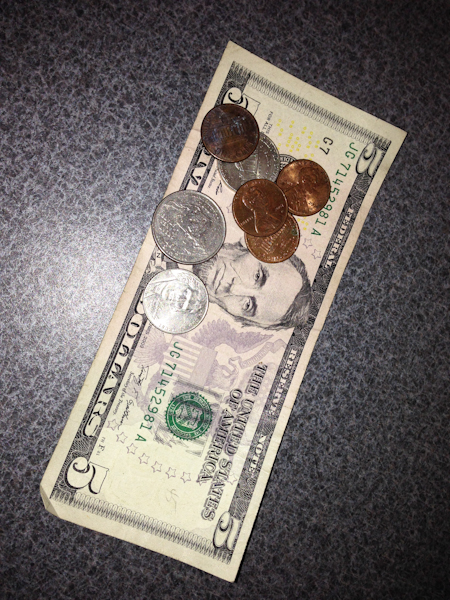Photo by: Henoc Kivuye
Earlier this year, the U.S. Senate and House of Representatives introduced the Fair Minimum Wage Act of 2013, companion bills that are set to raise the current minimum wage of $7.25 to $10.10 by 2015. In President Obama’s State of the Union address this year, he called for Congress to raise the federal minimum wage to $9.00, down from his projection of $9.50 in his 2012 address. According to a 2011 Public Religion Research Institute American Values survey, two-thirds of Americans favored increasing the minimum wage to $10 an hour.
“I think minimum wage should be raised a little bit, but not to [$10.10],” sophomore Jabbarri Jones said. “If we give everyone the same amount then that would make each state equal, which is not the case because some states have a higher cost of living. I think that there are some people who need more money than others.”
Most employees feel that the current minimum wage, $7.25, is not enough to live on. These employees are asking the legislatures to increase the present minimum wage.
“There is no doubt that it is difficult to make a living when you are only making $7.25 an hour; it is really, really challenging,” Director of Career Services Mark Chan said. “Everything is expensive: gas, housing, utilities and food is expensive.”
But increasing the minimum wage is complex. This would lead to inflation, which could create more problems for the economy.
“Inflation goes up even when minimum wage stays the same,” Chan said. “My encouragement to the legislatures is this: Can we at least keep up with inflation? Because otherwise people are just falling behind.”
Fast-food restaurants, such as Braum’s Ice Cream and Dairy Stores, stated that should minimum wage be increased, they would have to respond by doubling or even tripling the prices of their products.
“Increasing minimum wage is going to cause inflation,” Marc Casteel, General Manager of Braum’s at Memorial and Bryant, said. “If they raise minimum wage, then fast-food restaurants such as Braum’s are going to raise the prices on everything. There will be some effects on the economy and the market.”
Casteel suggested an alternative solution to the problem. He feels that the government should create two types of minimum wages for minors and legal adults.
“If you raise minimum wage a lot, then you are really raising it for kids, which is not what minimum wage is intended to help in the first place,” Casteel said. “We don’t make a distinction between children workers and adult workers. When you start paying bills then you are an adult, which causes problems for most people because they are not making enough money to support themselves at their jobs.”
Although having two separate wages for adults and children might sound like a good idea, this would create a different set of problems.
“People don’t talk about the facts that if you raise the minimum wage, whatever you are paying the adults you have to pay 16-year-olds the same amount,” Casteel said.
“Kids don’t need $10-an-hour jobs because for one thing, nobody will want to pay them that much.”
The United States government has programs in place to help supplement the income of people who are struggling financially. However, increasing government assistance means that taxpayers are going to have to pay more.
“I am a fan of going ahead and increasing the minimum rate to allow more people to work and live in dignity, even if it means increasing taxes,” Chan said.
The American message is that hard work is required for a person to succeed, and that each person has fair opportunity to move up the ladder, even with low-paying jobs.
“For someone working 80 hours per week, if you are determined and working at minimum wage, you are making enough if you use it wisely,” Casteel said. “Especially in a society like ours where you can invest, and you have opportunities to educate yourself to move up the ladder.”
For college students, Chan encouraged them to work smarter, not necessarily harder.
“Instead of working harder and sweating harder, use your mind to come up with a better solution,” Chan said. “Most people who go to college don’t go to college to work with their bodies; they go to college to work their minds.”
Many employees at minimum-wage jobs believe they are not getting a fair wage. Others say that it is fair opportunity, not fair wage, that is important to have.
“We are a capitalist society,” Casteel said. “That means that there are going to be some winners and some losers, and some people will work less hours and make more money than others. There is no expectation of fairness; there is the expectation of fair opportunity. You have the same opportunity to do something different.”












Be First to Comment